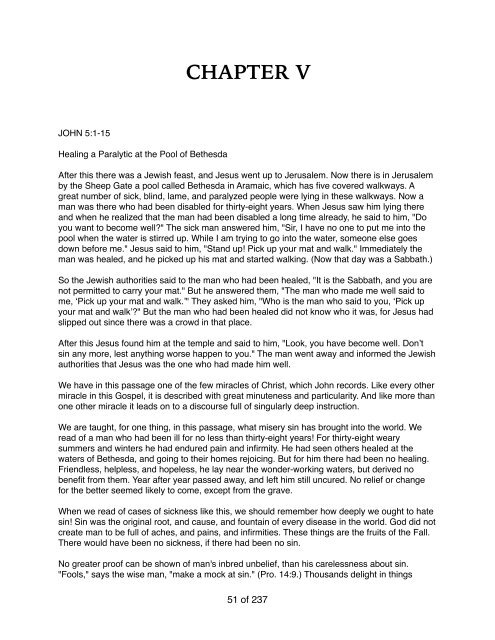J. C. Ryle John
John Charles Ryle (May 10, 1816 - June 10, 1900) was an evangelical Anglican clergyman and first Bishop of Liverpool. He was renowned for his powerful preaching and extensive tracts.
John Charles Ryle (May 10, 1816 - June 10, 1900) was an evangelical Anglican clergyman and first Bishop of Liverpool. He was renowned for his powerful preaching and extensive tracts.
Create successful ePaper yourself
Turn your PDF publications into a flip-book with our unique Google optimized e-Paper software.
CHAPTER V<br />
JOHN 5:1-15<br />
Healing a Paralytic at the Pool of Bethesda<br />
After this there was a Jewish feast, and Jesus went up to Jerusalem. Now there is in Jerusalem<br />
by the Sheep Gate a pool called Bethesda in Aramaic, which has five covered walkways. A<br />
great number of sick, blind, lame, and paralyzed people were lying in these walkways. Now a<br />
man was there who had been disabled for thirty-eight years. When Jesus saw him lying there<br />
and when he realized that the man had been disabled a long time already, he said to him, "Do<br />
you want to become well?" The sick man answered him, "Sir, I have no one to put me into the<br />
pool when the water is stirred up. While I am trying to go into the water, someone else goes<br />
down before me." Jesus said to him, "Stand up! Pick up your mat and walk." Immediately the<br />
man was healed, and he picked up his mat and started walking. (Now that day was a Sabbath.)<br />
So the Jewish authorities said to the man who had been healed, "It is the Sabbath, and you are<br />
not permitted to carry your mat." But he answered them, "The man who made me well said to<br />
me, ‘Pick up your mat and walk.’" They asked him, "Who is the man who said to you, ‘Pick up<br />
your mat and walk’?" But the man who had been healed did not know who it was, for Jesus had<br />
slipped out since there was a crowd in that place.<br />
After this Jesus found him at the temple and said to him, "Look, you have become well. Don’t<br />
sin any more, lest anything worse happen to you." The man went away and informed the Jewish<br />
authorities that Jesus was the one who had made him well.<br />
We have in this passage one of the few miracles of Christ, which <strong>John</strong> records. Like every other<br />
miracle in this Gospel, it is described with great minuteness and particularity. And like more than<br />
one other miracle it leads on to a discourse full of singularly deep instruction.<br />
We are taught, for one thing, in this passage, what misery sin has brought into the world. We<br />
read of a man who had been ill for no less than thirty-eight years! For thirty-eight weary<br />
summers and winters he had endured pain and infirmity. He had seen others healed at the<br />
waters of Bethesda, and going to their homes rejoicing. But for him there had been no healing.<br />
Friendless, helpless, and hopeless, he lay near the wonder-working waters, but derived no<br />
benefit from them. Year after year passed away, and left him still uncured. No relief or change<br />
for the better seemed likely to come, except from the grave.<br />
When we read of cases of sickness like this, we should remember how deeply we ought to hate<br />
sin! Sin was the original root, and cause, and fountain of every disease in the world. God did not<br />
create man to be full of aches, and pains, and infirmities. These things are the fruits of the Fall.<br />
There would have been no sickness, if there had been no sin.<br />
No greater proof can be shown of man's inbred unbelief, than his carelessness about sin.<br />
"Fools," says the wise man, "make a mock at sin." (Pro. 14:9.) Thousands delight in things<br />
51 of 237




